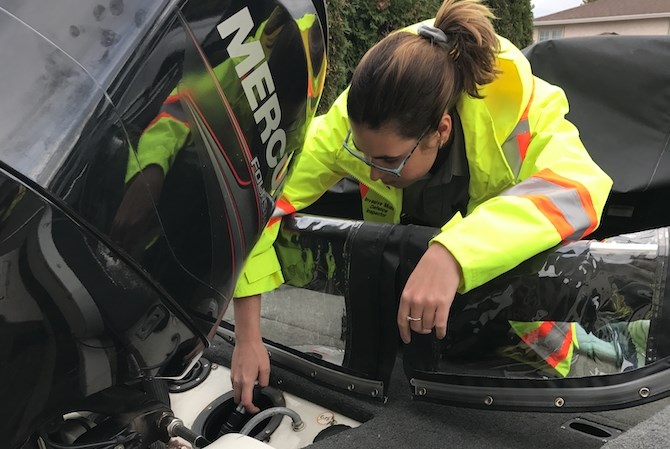
FILE PHOTO - An inspector can be seen looking for invasive mussels in a boat at a B.C. government inspection station in this undated file photo.
Image Credit: SUBMITTED/OBWB-OkWaterWise
July 17, 2022 - 6:02 PM
A barge from Lake Ontario containing thousands of invasive zebra mussels that was intercepted in late June on its way to work in the Lower Mainland belongs to a B.C. company that was well aware of its obligations to clean it.
The barge from Fraser River Pile and Dredge, which calls itself “Canada’s largest marine, land foundations and dredging company” was being shipped by truck in several sections and all of them had to be stopped by Conservation Officers. They found it laden with the invasive mussels B.C. has been trying to keep out of local waterways.
READ MORE: Thousands of invasive mussels removed from vessel heading to B.C.
“The owner of the company, actually, was very cooperative,” Sgt. Josh Lockwood, of the B.C. Conservation Officer Service, told iNFOnews.ca. “The owner had stated to us they had done their best to get the mussels off their boat.”
B.C., to date, has been successful in keeping the invasive mussels from entering B.C. from contaminated lakes in eastern Canada and the U.S.
“There are two ways to decontaminate a boat,” Lockwood said. “It either sits out of water for 31 days, in which case, anything that is live is no longer viable. The other is to apply a hot water wash. They said they washed it, but it wasn’t done to the satisfaction of the provincial government so those boats were detained for 30 days.”
The large self-propelled barge, separated into two loads, was returning to B.C. from a job on Lake Ontario.
One load was stopped and inspected in Manitoba and the other in Alberta. Neither province had the capability of decontaminating such large vessels.
While inspectors notified B.C. officials, the company didn't give any notification that they might be transporting contaminated vessels.
“Our officers contacted the trucking company and had them stop in Chilliwack,” Lockwood said. “Our officers attended and they put seals on the vessels to the trailer so they couldn’t be removed. It’s illegal to break the seal.”
Fraser River Pile and Dredge then arranged to have them hauled to a Richmond site that has a huge concrete berm barrier to put these vessels in for the 30-day storage period.
A team of eight officers spent 2.5 days scraping and burning the mussels off the barges. Then the owner had them painted with a special paint.
READ MORE: Overloaded B.C. invasive mussel-sniffing dog getting help
The mussels were taken to a lab where some were found to still be alive but there were none, not even dead ones, on the vessels when they were released recently by authorities.
“It’s illegal to import live or dead mussels into the province,” Lockwood said. “It’s classified as wildlife and it’s illegal to possess wildlife, dead or alive, in the province of British Columbia.”
That only carries a fine for about $250. The penalties can reach up to $1 million if such wildlife is released.
The incident is still being investigated and no decisions have yet been made about whether any charges will be laid.
“We always look for the cooperation of people coming in,” Lockwood said. “Some people are unaware. I’m not sure the company knew the law and the requirements were there. Having conversations with their management, they were more than apologetic because the management did not have that idea and, once they found out, they were totally cooperative as to what we needed to do.”
Part of the problem may have stemmed from the fact that Fraser River Pile and Dredge worked with a contractor who hired the trucking company. While, ultimately, Fraser River Pile and Dredge is responsible, the fact that three companies were involved likely contributed to some miscommunication, Lockwood said.
The good news is, given the fact that the barges were destined for the lower Fraser River, the risk of the mussels living in the salty water in that part of the river is low, Lockwood said.
Equally, the risk of the mussels, which “stick like glue” to watercraft, escaping from the barges en route across Canada is also low, he said.
One barge was trucked through Kamloops on Highway 1 while the other came down Highway 5 through Valemount and Kamloops.
It appears that the number of boats carrying mussels into B.C. is on the increase, even compared to pre-pandemic levels.
The checking station in Penticton, for example, has decontaminated 19 boats from high risk areas so far this year. None were found to have live mussels, Lockwood said.
The Fraser River Pile and Dredge website says it started in 1911 and has “extensive experience in regards to identifying and mitigating potential adverse impacts to the environmental resources within the upland and aquatic environments.”
It also says its environmental policy “highlights our commitment to meet or exceed all legal requirements and voluntary commitments.”
It’s based in New Westminster.
No one from the company returned calls from iNFOnews.ca as of publication time.
To contact a reporter for this story, email Rob Munro or call 250-808-0143 or email the editor. You can also submit photos, videos or news tips to the newsroom and be entered to win a monthly prize draw.
We welcome your comments and opinions on our stories but play nice. We won't censor or delete comments unless they contain off-topic statements or links, unnecessary vulgarity, false facts, spam or obviously fake profiles. If you have any concerns about what you see in comments, email the editor in the link above.
News from © iNFOnews, 2022